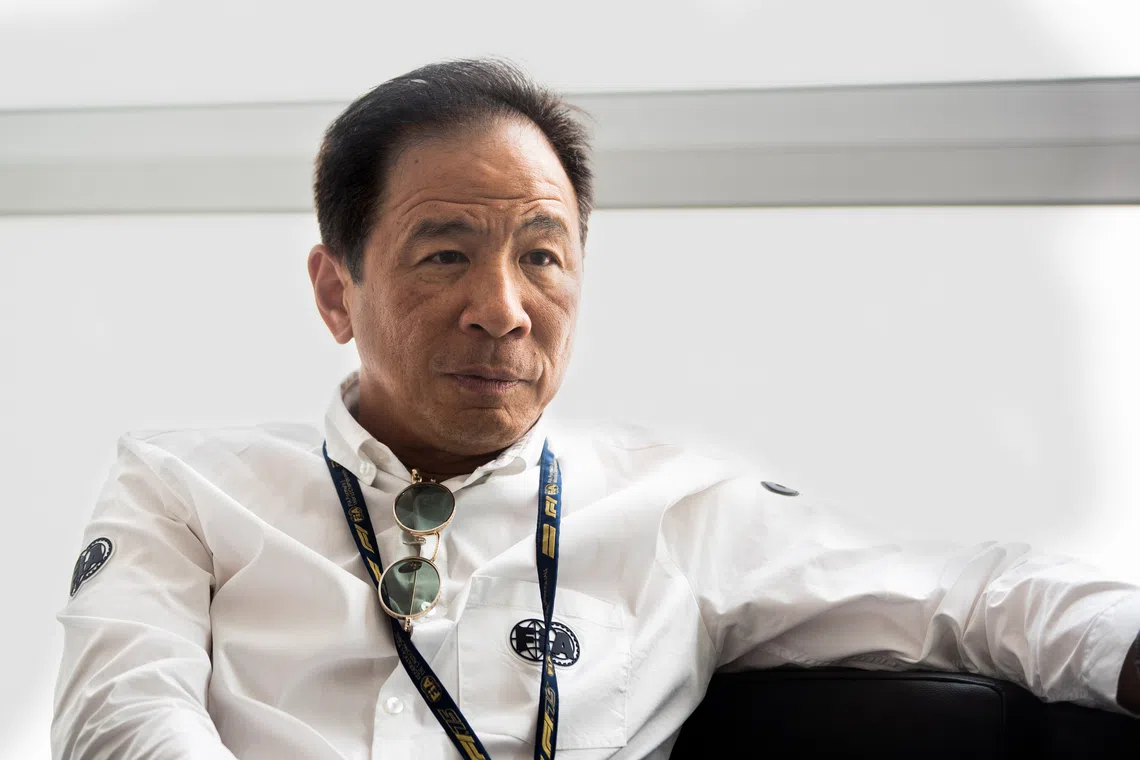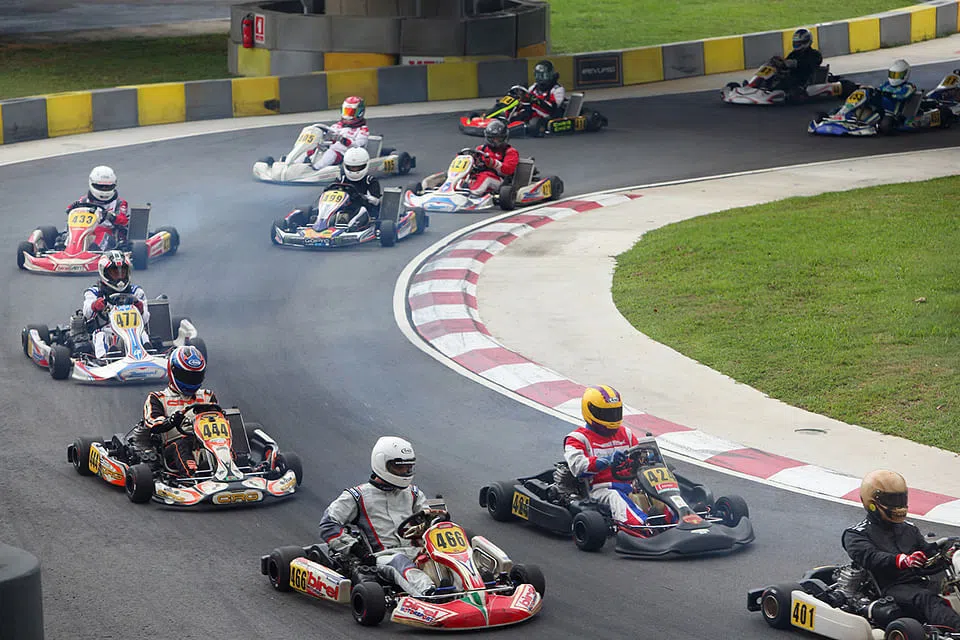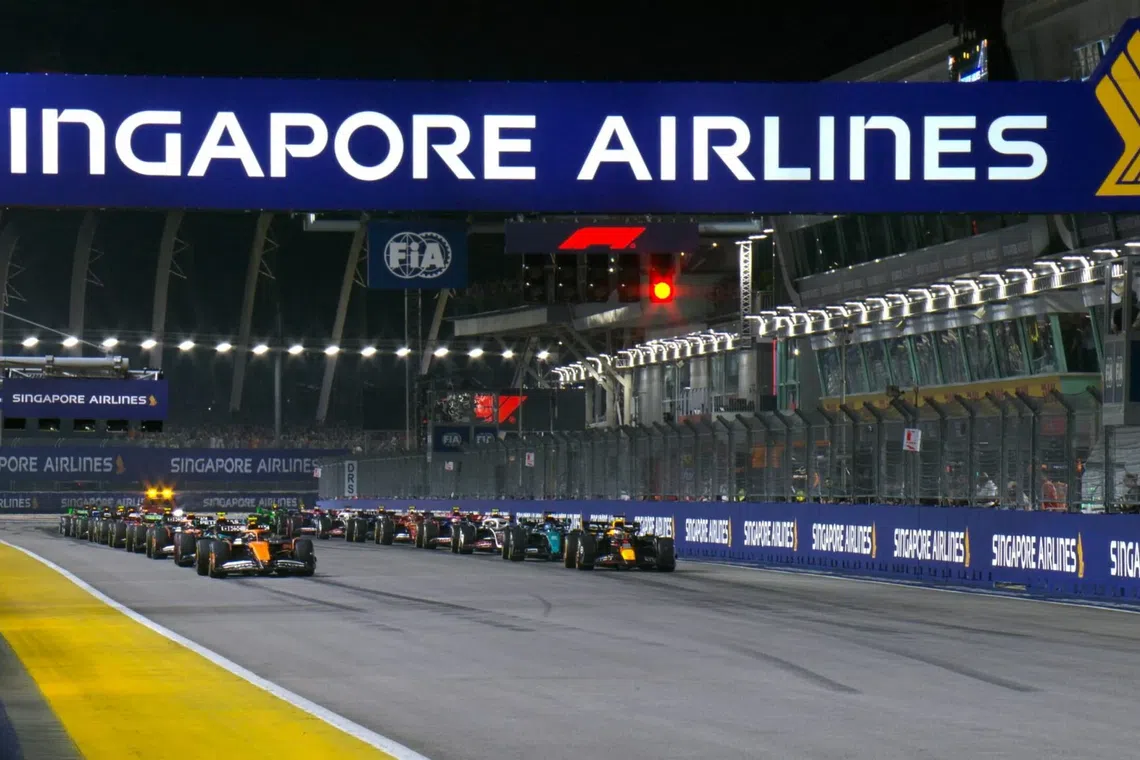From banking to the FIA: what Citi’s new Singapore head Lee Lung-Nien brings to the F1 governing body
Lee Lung-Nien has helped turn around a financially dire FIA, to the tune of a net 28.7 million euro swing
[SINGAPORE] Lee Lung-Nien – the first Singaporean in 50 years to be the Citibank country head for Singapore – was one of many corporate chiefs who attended the recently concluded Singapore Grand Prix, but he did so purely as a volunteer.
Outside of his day job, he is the Asia Pacific (Apac) vice president for sport at the Federation Internationale de l’Automobile (FIA), the global motorsports governing body. The FIA oversees racing series such as Formula 1 (F1), Formula E and the World Endurance Championship.
Elected to this position in 2021, Lee has been able to guide a remarkable turnaround at the sporting regulator that many may not have seen.
When he joined, the FIA had been haemorrhaging some 24 million euros (S$36 million) a year and was in danger of running out of funds within just a few years. Four years on, the FIA is about to make a profit of about 4.7 million euros instead.
Speaking to The Business Times at the Marina Bay street circuit on Sunday (Oct 5), Lee explained that he had been given the mandate from FIA president Mohammed Ben Sulayem to run the FIA less like a sports club and more like a corporation, owing to his extensive banking experience.
“I think (the FIA president) liked that profile,” said Lee about his 31-year career at Citi. “I was also head of anti-money laundering (AML), so it gives a credibility to (my) position.”
BT in your inbox
Start and end each day with the latest news stories and analyses delivered straight to your inbox.
When Ben Sulayem was elected, his mandate was built on “transparency”, “governance” and “corporate processes” – summed up by Lee as “doing things properly”. That push for increased professionalism is why the current set of FIA vice-presidents have careers in banking, law and finance, said Lee.
Founded in 1904, the FIA (like any long-running organisation) has developed its fair share of legacy issues. Things have “fallen between the cracks” over the years. To remedy that, Lee brought in management oversight, a willingness to ask “tough questions”, and the ability to heighten the FIA’s awareness of any issues in compliance or AML.
“In banking – revenue, expenses; that’s part of our everyday work,” he said. “In the FIA, prior to this current team … the way finance was being run was very different.”
Expenses in the FIA had soared in the five years before Lee took on his FIA role, so he brought in external consultants such as McKinsey & Company to take a fresh look at the organisation’s processes, revenue streams and expenses.
After “quite a bit” of expenses reduction through targeting corporate travel, excess staff and “money-sink” projects, the FIA now sees light at the end of the financial tunnel. Lee attributed that turnaround to more industry professionals joining the FIA.
“It’s like running a company. It’s the same skill sets,” he said. “That’s how you develop credibility, by showing we are responsible stewards of the FIA funds.”
Lee also explained how he helped hire a chief financial officer for the FIA after he joined – a position that, alongside the entire commercial team, did not exist prior to the latest FIA administration.
“Everyone was running around doing their own thing,” said Lee. “That’s how you end up with a 24 million euro hole.”
Leveraging connections and experience

Personal and professional connectivity is also something Lee keenly leverages at the FIA. His prior presidency of the local racing governing body Motor Sports Singapore allowed him to develop a deep network of connections in the Apac region.
“If the FIA or Formula One Management… needs to connect with, say, (Singapore’s) tourism board… that’s where I step in,” he said, adding that he facilitates an additional avenue of dialogue between the FIA’s European offices and key regional stakeholders.
His experience in the corporate environment at Citi also made him adept at going beyond the regular FIA meetings to cultivate deep ties with motorsports players in Apac.
“Every quarter, or every three times a year, we have a major Zoom call,” he explained. “This is over and above the twice-a-year meetings (officially organised by the FIA).”
These “town halls” are called in between the top-level bi-annual meetings, which include members of the FIA as far up the ladder as the deputy president.
“You want to talk about better communication? That’s the way to do it,” said Lee, noting that FIA’s Apac division used to work in “silos” in the past. Today, there is better coordination between the FIA and each member country’s clubs.
At the same time, he pushed for greater decision-making power for the Apac region, so it did not have to wait for responses from the FIA’s primary offices in France and Switzerland.
In his four years at the FIA, Lee also set up Apac versions of the FIA Motorsports Games, a sports event held biennially in Europe. The first Asia-Pacific Motorsports Championship was held in 2023, while the second edition was held this year in Sri Lanka from Sep 26 to 27.
This has created opportunities for more countries to compete in international motorsports at the grassroots level, in line with the FIA president’s goal to double motorsports interest globally.
The future of karting in Singapore

The KF1 karting circuit in Singapore risks shutting down after its lease ends in March next year. The track was laid out by Hermann Tilke, the legendary F1 designer whose credits include the Singapore, Malaysia and Shanghai circuits.
The company told CNA that it is currently in negotiations to renew or extend its lease, with the track the only karting circuit in Singapore for would-be professional racers to cut their teeth on. Singaporean Formula Three driver Christian Ho, having recently signed with New Zealand racing team Rodin Motorsport, once trained at KF1.
Lee however, said it was “too early” to worry about the future of grassroots motorsports in Singapore. Another karting track, perhaps one run by KF1 itself, could be created some time in the future.
He pointed out that karting was only one of the paths to professional racing, even if it may be the most popular one.
“Drivers… will find a way (to pursue their dreams),” said Lee, listing alternatives such as Gymkhana, autocross and even e-sports. He also pointed out that Singapore has produced “good” sportscar drivers, stretching back to even before KF1’s Kranji circuit existed.
He also noted the reality that only 20 drivers, or 22 next year, are on the F1 grid owing to the prohibitively expensive and cut-throat path to the top.
Not only that, the number of children and teenagers supported by their parents to pursue a racing career is “small”, a trend Lee does not expect to change soon.
F1: A halo event for Singapore

Still, F1 remains the dream for Singapore’s hopefuls Kabir Anurag and Christian Ho, as well as F1 Academy hopeful Kareen Kaur. And the race, which concluded its 18th edition on Sunday, remains a halo event for the country.
“The F1… it’s key, right” asked Lee. “It is, I believe, the only high-key premier event that we have in Singapore.”
The event brought in S$2.2 billion in tourism receipts from 2008 to 2024, thanks to about 720,000 international visitors. This year, the F1 race had more than 300,000 spectators at the track across all three days, with more than 40 per cent of race attendees usually hailing from overseas.
Singapore’s “world-class” status as a transportation hub — with its airport, logistics and infrastructure standing out globally.
“If you speak to any FIA staff, any team … if you ask them to name their top two races, Singapore will be named,” said Lee, citing Singapore’s strength in organisation. “(The F1 race) has put Singapore on the map.”
Lee also pointed to discussions in neighbouring countries like Malaysia that concluded the cost to bring an F1 race back to the Sepang International Circuit would be too high, especially when trying to compete with Singapore and Thailand.
In June, the Thai government approved a US$1.2 billion bid to host a Bangkok F1 race in 2028. Despite its geographic proximity, though, Lee does not believe that it would hurt Singapore’s race.
“It’s good for us,” he said. “If you do it back-to-back, can you imagine? You come to Singapore, then you go to Thailand.”
Lee also said a Bangkok race would be a “great opportunity for Singapore to step up” and added that the FIA will help support the Thailand race promoters as required, if their bid is successful. But even if it may look like competition, it will likely not replace Singapore.
“I think Singapore will always be special,” he said.

